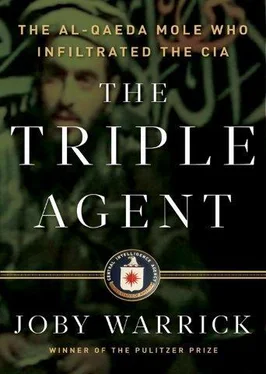It seemed rash to bin Zeid—very possibly, Balawi was being lured into a trap—but already it was too late to argue. Bin Zeid’s next e-mails to Balawi went unanswered. The final weeks of May passed, then all of June. Now it was July, and there had not been a word from the informant in two months.
Bin Zeid discussed the developments with Darren LaBonte, the CIA officer from Amman, who was now officially partnered with bin Zeid as the American case officer for Balawi. The long silence certainly was bad news, they agreed. Maybe Balawi was dead, or perhaps he had crossed the line and joined the Taliban, either voluntarily or by force.
The idea of sending the untrained, untested Balawi to Pakistan had been a gamble from the beginning, bin Zeid knew. It was one of dozens of long shots and what-ifs that were being flung at an incredibly complex problem: getting inside the inner circle of al-Qaeda. Eventually, given enough time and the CIA’s deep pockets, one of them was sure to stick.
The recorder’s light flicked on. Humam Khalil al-Balawi shifted in his seat and waited for the question from his Taliban interviewer.
“Abu Dujana is a personality known for articles and contributions posted on jihadist forums on the Internet. We would like the kind reader to know more about him. Who is he, then?”
Balawi regarded the reporter, an Arabic-speaking Pashtun writing for a midsummer edition of the online Taliban magazine Vanguards of Khorasan . It was exactly the right question. Who was he, really?
Balawi began with the basics, lightly fudged. “Your little brother comes from the Arabian Peninsula, may Allah liberate it,” he said. “I am a little over thirty years old, married and I have two little daughters.”
It was a surreal moment for a man who had worked hard to conceal so much about himself, from his Internet alter ego to his decision to travel to Pakistan. Now he was submitting to the jihadist equivalent of a celebrity interview, revealing to the world at large that he—or the part of him that was Abu Dujana al-Khorasani—had quit the writing business to perform jihad. There were real risks to going public; every word in the article would be scrutinized, by intelligence officers from the CIA and Jordan’s Mukhabarat, of course, and also by al-Qaeda. At this moment everyone was watching, and no one on either side was sure what to make of Balawi.
The topic turned to Abu Dujana’s Internet columns, and Balawi was able to breezily recount the circumstances behind his first online essay about al-Qaeda’s defeat in the Iraqi city of Fallujah. He talked about other writers he admired. He threw in a hearty denunciation of the “Hagana dogs, the Jews,” who had covertly hacked their way into jihadist Web sites, including the former al-Hesbah site for which he had once served as moderator. The cyberattacks had “closed forums and destroyed links to jihadist publications,” he complained.
But again, he was asked about himself. What changed in you after you stepped into the land of jihad?
“You should rather ask, what did not change in me?” Balawi said. “I was reborn here.”
That much was true. What was less certain at this time was whether Balawi would survive infancy in his alien new world. Balawi had indeed received an invitation to board with the region’s most powerful Taliban group. It had come from the leader of the group, a short, paunchy man with an outlandish black beard and a sadistic sense of humor. His name was Baitullah Mehsud, and he was, at the moment, the most wanted man in all of South Asia.
Baitullah could barely read and spoke little Arabic and thus could scarcely appreciate the Jordanian’s writerly gifts. But Baitullah was a man who lived according to his instincts, and they had pronounced the young physician trustworthy after their first meeting. The two had a mutual acquaintance—one of Baitullah’s Arab supporters knew Balawi from his days as a Web site moderator and had vouched for him—and the Taliban commander had been impressed by Balawi’s tale of being pressed into service by Jordan’s intelligence agency. Balawi’s training as a physician held immense appeal to Baitullah, who was afflicted with diabetes and leg ailments and desperately short of medical care for his sick and wounded fighters. Any lingering doubts were resolved when Balawi pulled out a large wad of bills, travel money given to him by the Mukhabarat.
But not everyone was ready to believe in Balawi. In the Mehsud camp, Baitullah’s opinions were often contested by his own kinsmen, particularly his cousin Qari Hussain Mehsud. Just six months earlier, Qari had beheaded a kidnapped Polish geologist in a grisly, videotaped execution, in defiance of Baitullah’s orders. The killing had strained relations between the cousins for months. Now Qari was eyeing the Jordanian suspiciously.
Outside the Mehsud clan, other groups also were openly suspicious of Balawi. Certain that he was a spy, Sirajuddin Haqqani joined al-Qaeda commanders in refusing to meet Balawi or even be in the same building with him. If Baitullah Mehsud were to suddenly disappear, Balawi might well share the same fate as the Polish geologist.
That is, if the Americans didn’t kill him first. The unrelenting threat of death from a missile strike had begun to gnaw at Balawi, just as it did others in the tribal belt. The low buzzing of the CIA drones was nearly constant now, and it so unnerved Balawi that he often had trouble sleeping. There had been eight Predator strikes in North or South Waziristan since early June, including two in the village, Makeen, where Balawi and a small entourage of Mehsud fighters had been bedding in different houses, moving every few days for security. They traveled in groups of two or three and avoided cars when possible.
Feeling safer outdoors, Balawi sometimes moved his pallet into the courtyard. He stared into a black sky thick with humidity and unseen threats, the interviewer’s question still flicking at his addled brain: Who are you?
The seed had been planted by Balawi himself. I could go to FATA , he told Ali bin Zeid one day. FATA is the Federally Administered Tribal Areas, the strip of mountainous country in northwestern Pakistan along the border with Afghanistan. The very name is a synonym for rugged, ungovernable, backward, extreme. It is al-Qaeda country. And Balawi was saying he had contacts there.
Bin Zeid was listening.
It had happened in February, during one of their dinners in Amman. The two had spent several evenings together, and the conversations had become relaxed. Doctor and spy had even found a few common interests, such as a mutual dislike for Jordan’s Muslim Brotherhood, the formerly radical Sunni Islamic movement that had cut a deal with the monarchy that allowed it to become a legitimate political party. Balawi had attended a few of the Brotherhood’s mansaf dinners, named after the rice and lamb dish that is a national favorite in Jordan and a popular choice at fund-raising banquets.
“The people of mansaf,” bin Zeid said mockingly. “They eat mansaf and talk about jihad without actually doing anything.”
Perhaps sensing an interest, bin Zeid also began to slowly pull back the curtain on the world of the Mukhabarat. The spy service’s reach is vast, he said, and many of its greatest achievements have never been publicly acknowledged. Bin Zeid explained how he himself had set up sting operations in which volunteers for holy war in Iraq were lured to a pickup point near the border, only to find the Mukhabarat waiting for them, he said.
Balawi respectfully nodded his approval.
It was also true, bin Zeid continued, that Jordan had supplied the evidence that led to the fatal missile attack against Abu Musab al-Zarqawi, leader of al-Qaeda in Iraq. And the Mukhabarat had netted much bigger prey. He claimed that a Jordanian spy had been behind one of the greatest and most mysterious assassinations of a terrorist figure in decades, the 2008 slaying of former Hezbollah security chief Imad Mughniyeh. The man who was dubbed Abu Dokhan—the “father of smoke”—because of his uncanny ability to elude capture had been killed by a bomb hidden in the headrest of his car in Damascus. Initial speculation had pointed to a rival Hezbollah faction or Syrian agents. But U.S. terrorism experts came to suspect Israel’s Mossad spy agency, despite Israel’s strong denials, simply because the hit had been so exquisitely planned and executed. Mughniyeh’s name had been on numerous most wanted lists, including that of the FBI, which blamed the Lebanon-born militant for separate bombings in 1983 of the marines’ barracks in Beirut and the U.S. Embassy there. The latter strike had killed more than sixty people, including eight CIA employees. It was the deadliest single event in the history of the U.S. intelligence agency. And it was the Mukhabarat, bin Zeid said, that had exacted vengeance.
Читать дальше












